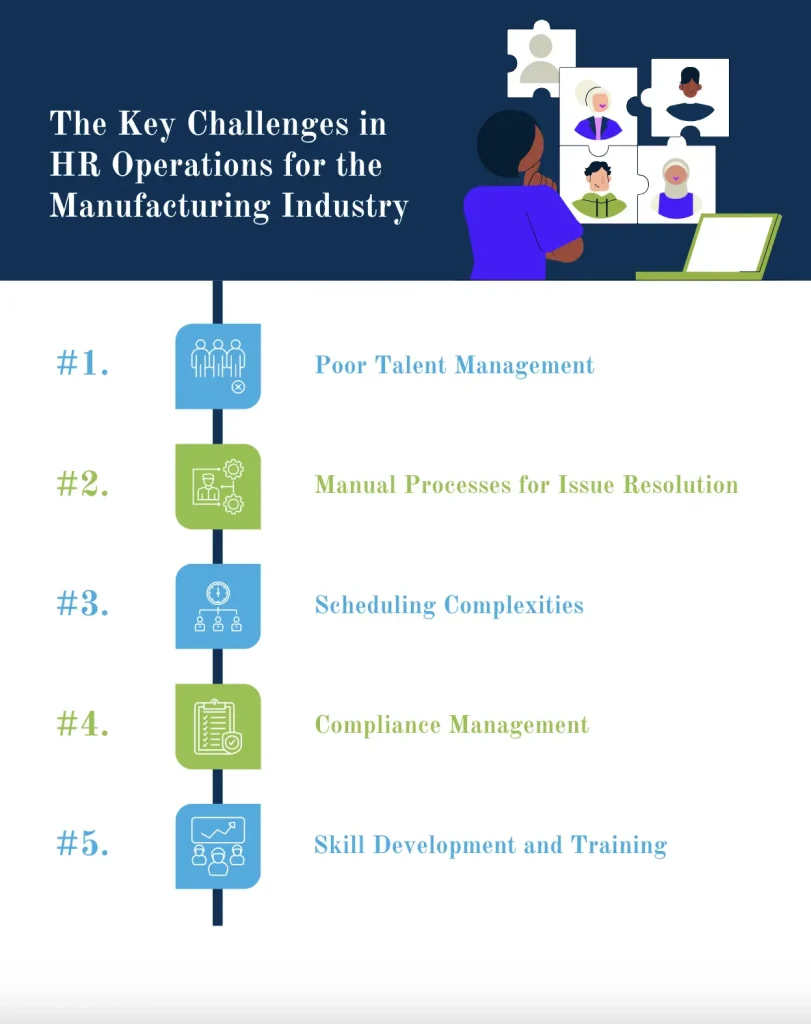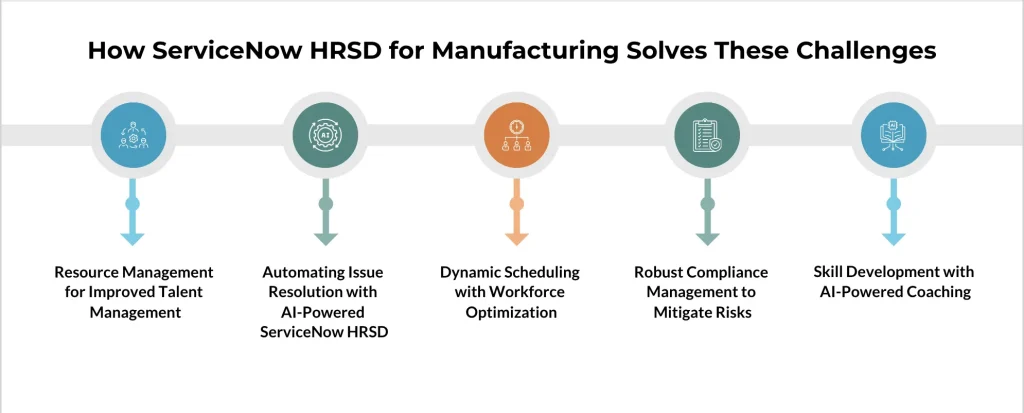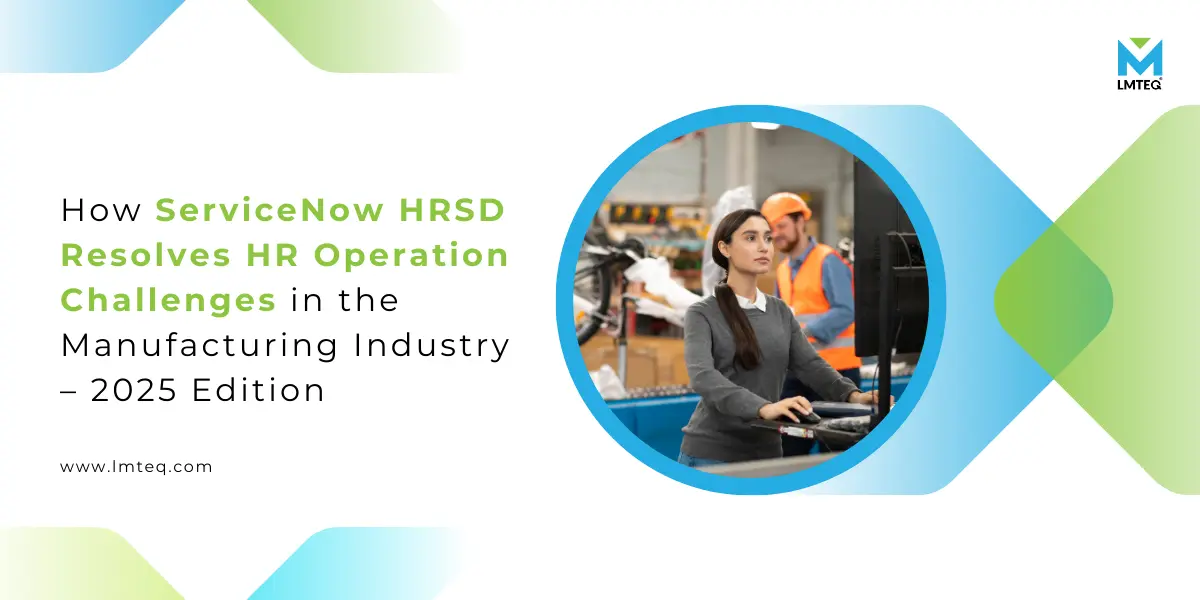The future of manufacturing hinges on a skilled, engaged workforce—yet managing human resources efficiently continues to be a major challenge.
Approximately 80% of manufacturers recognize that attracting and retaining skilled talent is one of their top business challenges, highlighting the need for improved recruitment strategies and talent management solutions. But beyond recruitment, manufacturing HR departments face ongoing issues like manual processes, compliance complexities, and scheduling difficulties.
In the face of these hurdles, manufacturers must turn to cutting-edge solutions that help streamline operations. ServiceNow HRSD for manufacturing emerges as a game-changing technology, offering powerful tools that address these challenges head-on, driving greater efficiency and workforce optimization.
Let’s explore how ServiceNow HRSD can revolutionize HR functions in the manufacturing industry, making them smarter, faster, and more agile.
Feel free to jump to any section to learn more on how ServiceNow HRSD resolves HR challenges in the manufacturing industry.
The Key Challenges in HR Operations for the Manufacturing Industry

Poor Talent Management
Manual Processes for Issue Resolution
Scheduling Complexities
The complexity of scheduling in manufacturing—driven by fluctuating demand, shift-based work, and unexpected absences—creates significant challenges. Coordinating schedules for a large, diverse workforce can lead to inefficiencies, operational disruptions, and overworked staff. With inadequate visibility into resource availability, HR teams find it difficult to make proactive decisions and address issues before they affect production.
Compliance Management
Manufacturers must adhere to a vast range of industry-specific regulations—ranging from labor laws to environmental standards. Managing compliance manually exposes HR teams to risk. Whether it’s ensuring proper training for safety gear, upholding labor laws, or keeping track of health regulations, HR departments need a robust system to stay ahead of compliance requirements and avoid costly fines or safety violations.
Skill Development and Training
How ServiceNow HRSD for Manufacturing Solves These Challenges

1. Resource Management for Improved Talent Management
ServiceNow HRSD is equipped with resource management features that address the challenge of poor talent management in manufacturing. By providing a consolidated view of resources across different teams and locations, HR teams gain insight into up-to-date availability, skill sets, and risks associated with employee workloads.
The timesheet integration within ServiceNow HRSD ensures accurate tracking of work hours and overtime, minimizing discrepancies and enhancing visibility into overall workforce engagement. Furthermore, resource workspace management enables HR professionals to make informed decisions regarding staffing requirements, improving recruitment processes and talent allocation.
Benefit – HR teams can better allocate resources, track staff availability, and match skilled employees with the right roles, improving both workforce efficiency and talent retention in the manufacturing space.
2. Automating Issue Resolution with AI-Powered ServiceNow HRSD
Manual processes for issue resolution often result in delays, human errors, and frustrated employees. ServiceNow HRSD’s Issue Auto Resolution feature uses AI-driven automation to swiftly resolve common HR issues like benefits inquiries, leave requests, and more. By employing intelligent AI-powered search, ServiceNow ensures employees find exactly what they need, when they need it, saving HR teams valuable time and reducing friction in daily operations.
With machine learning algorithms, ServiceNow HRSD can even escalate unresolved issues to the appropriate live agents, ensuring problems are resolved with the highest level of accuracy and customer satisfaction. Integration with popular business applications such as Gmail, Zoom, GitHub, and Box allows seamless issue tracking and resolution in a familiar digital ecosystem.
Benefit – Employees get quick resolutions for HR-related inquiries, HR staff save time on routine tasks, and overall employee satisfaction (ESAT) increases due to faster response times.
3. Dynamic Scheduling with Workforce Optimization
The manufacturing sector thrives on efficient workforce scheduling, but fluctuating demand and unplanned absences make it a constant challenge. ServiceNow HRSD solves this problem with its dynamic scheduling capabilities within the workforce optimization for the ServiceNow HRSD feature.
By providing visibility into employee availability, shift rotations, and vacation or time-off requests, ServiceNow HRSD enables HR teams to seamlessly adapt to any scheduling complexities.
Furthermore, the solution’s on-call lists and advanced shift management tools empower HR teams to minimize gaps in staffing, ensuring the right person is always available for critical operations.
Benefit – Manufacturing companies can adapt swiftly to scheduling challenges, improving production efficiency and avoiding downtime due to staffing shortages.
4. Robust Compliance Management to Mitigate Risks
Compliance is non-negotiable in the manufacturing sector, and managing it manually increases the risk of falling behind on critical regulations. ServiceNow’s Employee Document Management customizable feature enables HR teams to proactively manage compliance with local and international labor laws, safety standards, environmental regulations, and more.
By offering real-time insights into the company’s adherence to compliance policies, ServiceNow HRSD helps HR departments identify potential risks before they become audit findings or legal issues. It also streamlines documentation management and automates updates to regulatory requirements, keeping businesses ahead of changing standards.
Benefit – Organizations can reduce the risk of non-compliance by maintaining up-to-date records and receiving timely alerts, ensuring smoother audits and avoiding legal complications.
5. Skill Development with AI-Powered Coaching
Continuous skill development is a key factor in keeping a workforce competitive and agile in the face of new technologies and business demands. With ServiceNow HRSD’s Workforce Optimization feature, HR teams can offer personalized skill and coaching programs. ServiceNow uses AI to assess employee performance, recommend personalized development opportunities, and track progress toward career goals.
These AI-generated recommendations help manufacturers design tailored training plans for their employees, ensuring they acquire the skills needed to meet evolving business needs and future-proof their roles.
Benefit – Manufacturers can increase employee productivity by offering customized training, addressing skill gaps proactively, and fostering a culture of continuous learning.
Streamline Case Resolution With AI-powered ServiceNow HR Solutions
With ServiceNow HRSD’s case and knowledge management, HR teams in the manufacturing industry can efficiently handle and resolve employee inquiries using custom or out-of-the-box automated workflows, enhancing employee satisfaction. Additionally, AI-powered virtual agents accelerate issue resolution by providing tailored solutions through prebuilt or custom conversations based on business needs. Furthermore, these capabilities seamlessly integrate with third-party collaboration tools like Slack and Microsoft Teams, streamlining HR case management and improving overall employee satisfaction by 50%.
Also Reads:
Key Takeaway
In conclusion, the manufacturing industry faces unique HR challenges in today’s dynamic environment. Attracting top talent, managing complex schedules, and ensuring compliance can be overwhelming.
By leveraging the power of ServiceNow HR solutions for the manufacturing industry, the HR team can enhance workforce efficiency, improve employee engagement, and achieve greater operational agility.
As a certified ServiceNow partner, we specialize in implementing tailored HRSD solutions that address your unique business needs.
Contact us today to explore how we can help you optimize your HR operations!

